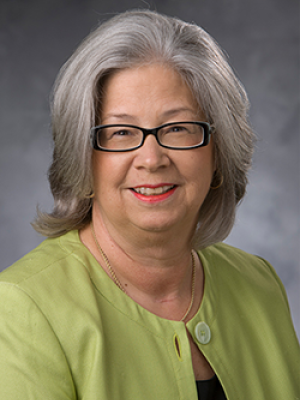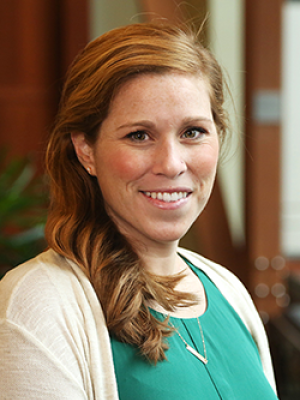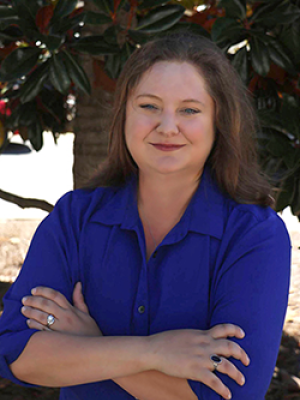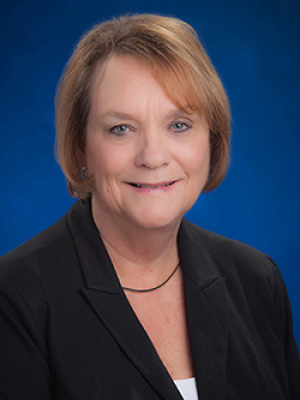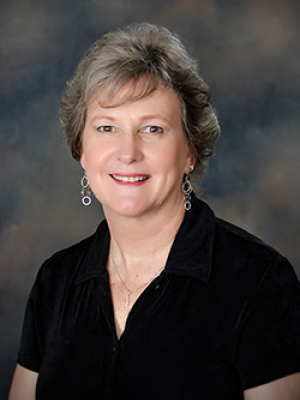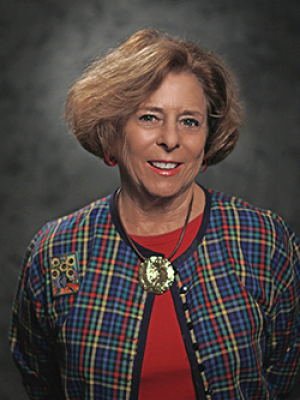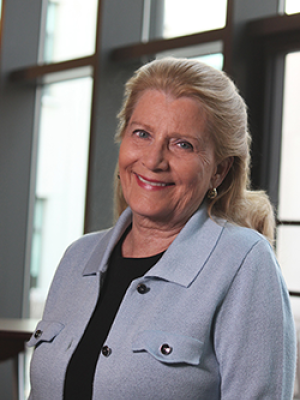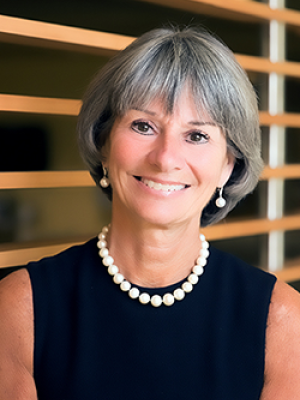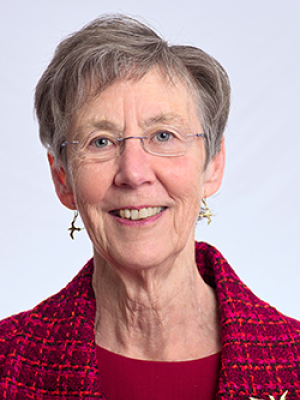2018 School of Nursing Alumni Awards
Distinguished Contributions to Nursing Science
Elizabeth I. Merwin, PhD, RN, FAAN, is the Ann Henshaw Gardiner Professor of Nursing and executive vice dean of Duke University School of Nursing and a professor emerita of nursing at the University of Virginia (UVA). She is an accomplished nursing and health services researcher whose work has focused on improving care for underserved populations in rural areas and mentally ill, impoverished, and minority populations.
Merwin has a particular interest in reducing health disparities, shortage of health professionals in rural and underserved areas, and in identifying strategies to increase diversity within the health professions. The National Institutes of Health (NIH) and other external funding agencies have consistently funded her research programs. Her current study on reducing health disparities in seriously mentally ill, rural, and minority populations focuses on individuals under the age of 65, who are eligible for Medicare due to a disability and mental illness.
Merwin was previously the Madge M. Jones Professor of Nursing and associate dean for research at the UVA School of Nursing. While at UVA, she conducted an NIH-funded study on shortages of health professionals in rural areas. She was the principal investigator and director of a National Institutes of Health/National Institute of Nursing Research funded Rural Health and Nursing Research Center, where many pilot studies incorporated technology to improve care.
In 2008, she served as editor of the Annual Review of Nursing Research volume on rural health. She co-conducted two workforce studies on the supply and demand for certified registered nurse anesthetists, which were funded by the American Association of Nurse Anesthetists.
At the Agency for Healthcare Research and Quality, Merwin has been a review committee member for the Healthcare Systems and Value Research study section for five years, and she is a scientific reviewer on the Health Care Research Training study section.
She was elected to the American Academy of Nursing in 1994, and in 2008, she received the Distinguished Professor Award from the UVA School of Nursing.
Merwin earned a PhD in health services organization and research and a master of science in nursing degree from Virginia Commonwealth University. She received a bachelor of science in nursing degree from Radford College.
Trailblazer
Tara K. Hart, BSN’15, RN, BA, has achieved great success in her career since graduating from Duke University School of Nursing three years ago. Hart is a clinical nurse II at Duke University Hospital. Her day-to-day responsibilities include treating patients across the lifespan. In addition to treating emergency room patients, she serves as a trauma narrator and a resource for trauma patients, and participates in the department’s trauma committee. She also precepts nursing students and new graduate nurses. Her desire to pursue the field of nursing initially developed due to her passion for bedside patient care.
In 2017, the American Health Council recognized her as a Leader in Nursing among American Best Nurses and invited her to join its nursing board. As a board member, she will share her knowledge and expertise on emergency nursing and trauma.
While she was a student at Duke, Hart traveled to Guatemala as part of the Nursing Students Without Borders student group. She worked with CureAmericas Global, a nonprofit organization, that partners with communities to save the lives of mothers and children by providing health services and education in underdeveloped countries. She worked in a remote region of Guatemala that is known as the “Triangle of Death” due to its maternal and child mortality rates. Hart also traveled to the village of Ntagacha, Tanzania, to provide nursing care to orphan children in the City of Hope compound.
Hart was also recognized with the 2015 Annie Beery Bieber Award for Outstanding Leadership and the 2015 Faculty Award from the Duke Emergency Nursing Students (DENS). She currently is a member of the Beta Epsilon Chapter of Sigma Theta Tau International Honor Society and the Emergency Nurses Association. She continues to serve the Duke University School of Nursing community whenever asked and is committed to supporting its mission.
Hart earned an accelerated bachelor of science in nursing degree from Duke University School of Nursing and bachelor of arts in human development and elementary education from Washington College.
Clinical Practice Excellence
Mary Johnson, DNP’15, MSN’12, BSN’09, APRN, FNP-BC, CWP, is committed to community health and wellness. She is director of health services at Meredith College, where she provides health services for almost 2,000 students. Prior to joining Meredith, she worked for several years as a provider in primary and urgent care settings and led a large program to promote vaccines while working in the convenience care clinics at Target.
At Meredith, Johnson is a member of the college incident management team, wellness advisory commit- tee, safety and health committee, and various campus task forces related to student wellness. She also is an advisor for the Peer Educators Advocating Responsible Lifestyles, a student-led initiative that addresses health topics related to college students, and as a preceptor for nursing students from the University of North Carolina and Duke University School of Nursing.
Recently, Johnson received the National Wellness Institute’s certified wellness practitioner certification, which symbolizes an individual’s strong academic preparation, professional competency in wellness programming, and commitment to continuing education, scholarship, and professional development. She continues to use her knowledge to influence her practice and campus education.
In 2017, she was elected to the board of Duke Women’s Impact Network (WIN), and she hopes that her work with WIN will help engage more women in volunteer and philanthropic leadership positions, making Duke a stronger university than ever before.
This year, Johnson will join the American College Health Association’s Leadership Institute and the first cohort for the College Health and Wellness Professional Certification. The certification program provides a unique platform for college health and wellness professionals to learn, grow, and exchange ideas with others who are also facing the challenges of providing high-quality care to the college student population.
Johnson serves on the National Consortium for Building Healthy Academic Communities, the North Carolina Immunization Coalition, and the Beta Epsilon Chapter of Sigma Theta Tau International Honor Society.
Johnson earned a doctor of nursing practice degree, a master of science in nursing degree as a family nurse practitioner, and an accelerated bachelor of science in nursing degree from Duke University School of Nursing. She received a bachelor of science degree in molecular biology from Meredith College.
Distinguished Service
Joan M. Stanley, PhD, MSN, BSN’71, CRNP, FAAN, FAANP, has been an extremely dedicated volunteer leader of Duke University School of Nursing and Duke University for more than two decades.
She is a member of the Duke University Alumni Association Board of Directors and has served
as a member of Duke Women’s Forum in the D.C. area. She was also a member of the Duke University School of Nursing Advisory Board and chair of the advisory board’s strategic planning committee. A member of the school’s Nursing Alumni Council for 11 years, she served as president for two years and past president for an additional two years. In addition, she has been a member of the School of Nursing Annual Fund reunion committee. Stanley is also a generous donor who provides her own resources to support the school and encourages others to do the same.
Beyond her volunteer work with Duke, Stanley has led an extraordinary career that has profoundly impacted the nursing profession. She is currently chief academic officer of the American Association of Colleges of Nursing (AACN). She acts as the organization’s representative to numerous nursing education initiatives, including the APRN LACE Network, which developed the “Consensus Model for APRN Regulation: Licensure, Accreditation, Certification, and Education,” a landmark report that defines advanced practice registered nurse (APRN) practice.
Stanley previously was AACN’s director of higher education policy. She held a faculty position in the adult primary care nurse practitioner program at the University of Maryland for five years, and continues to practice as an adult nurse practitioner at the University of Maryland medical system. She is a Fellow in the American Academy of Nursing and the American Academy of Nurse Practitioners.
Stanley earned a bachelor of science in nursing degree from Duke University School of Nursing, a master of science in nursing degree from the University of Maryland at Baltimore, and a PhD in higher education policy and organization from the University of Maryland at College Park. She also received a certificate in adult nurse practitioner from the University of Maryland School of Nursing.
Humanitarian
Catherine Parsons Emmett, PhD, BSN’81, ARNP, ACHPN, has served the elderly and worked in the field of hospice and palliative care for more than 30 years.
Emmett has held leadership positions in various organizations in the community, including the Florida Bioethics Network, End-of-Life Center at the Morsani College of Medicine at the University of South Florida, West Coast Council of Advanced Nursing Practice, Area Agency on Aging, Health and Welfare ministry at the United Methodist Church, the Alzheimer’s Association, and other organizations.
She is a clinical practice specialist and professional development facilitator at Empath Health in St. Petersburg, Florida, one of the largest community-based hospice and palliative care programs in the country. Prior to joining Empath Health in 2012, she was a clinical manager and clinical nurse specialist at Chapters Health System in Florida.
Emmett is a courtesy assistant professor at the University of South Florida Health College of Nursing. She is a frequent speaker at national and state conferences on clinical management of hospice patients and on advance care planning. She routinely leads workshops and conferences on palliative care, end-of-life decision making, and bereavement. She also serves as a reviewer for the Geriatric Nursing Journal.
A national expert in gerontological nursing, Emmett was selected to participate in the validation of new adult-gerontological clinical nurse specialist competencies as part of a national project, “Transitioning to adult-gerontology APRN education: Ensuring the APRN workforce is prepared to care for older adults,” which was funded by the John A. Hartford Foundation.
Emmett earned a PhD in aging studies from the University of South Florida. Her dissertation focused on the advance care planning experience of individuals with mild cognitive impairment. She earned a master of science in gerontological nursing degree from the University of Florida and a bachelor of science in nursing degree from Duke University School of Nursing.
Honorary Alumna
Frances D. Mauney, MEd, RN, retired as associate dean of development and alumni affairs at Duke University School of Nursing in 2016. Her success in increasing donors is attributed to her passion for nursing and knowledge of the history of the school. Her vivacious personality and attention to detail were evident in every event she organized around the country. She exemplified the spirit of the school, leading by example in her own generosity to the Annual Fund.
Mauney joined the school in 2008 as associate dean of clinical affairs. She assumed the position of associate dean of development and alumni affairs in 2010. Mauney and her team raised $38 million toward the $43 million goal of the Duke Forward Campaign. She organized and coordinated the annual nursing reunion, the Nursing Alumni Council, the dean’s Board of Advisors, and other alumni affairs projects. Other positions held at Duke included interim CEO of Duke Regional Hospital and chair of the hospital’s board of trustees.
Presently, she serves on the Duke Hospital Friends of Nursing Advisory Board and the board of TROSA, a nonprofit that helps people with substance abuse disorders. She previously held positions on the North Carolina State Health Care Commission, the North Carolina Medical Society Foundation, and the Oncology Nursing Society Development Board. She has also been a consultant to other nursing schools regarding fundraising.
Mauney was executive vice president of operations and chief operating officer of NCH Health System in Naples, Florida, for seven years. Prior to that, she was executive vice president of operations at Mission Saint Joseph Hospital in Asheville, North Carolina, for nine years. She also was a staff nurse at the Veteran Affairs Medical Center in Asheville, where she was evening supervisor of the cardiovascular unit. Earlier in her nursing career, she was assistant director of St. Joseph’s Hospital in Asheville, where she supervised all nursing areas including clinical nursing, nursing education, and quality assurance.
Mauney earned a bachelor of science in nursing degree from the University of Cincinnati and a master’s degree in education from Washington University in St. Louis, Missouri. She completed the nursing administration program at Duke University School of Nursing and later served as a Wharton Fellow at the Wharton School of Finance at the University of Pennsylvania. She earned an advanced certification in nursing administration from the American Nurses Association.
Honorary Alumna
Cynthia W. Vanek, DNP, MSN, RN, CNAA, is an executive leader in nursing who has spent decades in service to the profession and to Duke University. She is an adjunct faculty member at Southern New Hampshire University, where she teaches leadership development in health care. She also offers independent contractor services designed to help health care systems improve nursing and operating services.
Vanek has dedicated 42 years to the profession of nursing. She began her career in pediatric nursing at Strong Memorial Hospital in Rochester, New York, and led the effort to open the hospital’s pediatric intensive care unit, the first one in upstate New York at the time.
During her extensive career in nursing, she has held numerous leadership positions, including chief nursing officer at Good Samaritan Medical Center in West Palm Beach, Florida, where she led the center’s affiliation agreement with Duke University Medical Center, which created the Helen and Harry Gray Cancer Institute at Good Samaritan Medical Center. This agreement also commenced a 24-year relationship dedicated to excellence in nursing practice between Vanek and Duke Health. In addition, Vanek was a senior vice president and chief operating officer at Indian River Medical Center in Vero Beach, Florida. While there, she led affiliations with Duke Heart Center and Duke Cancer Institute.
Formerly a consulting associate faculty member at Duke University School of Nursing, Vanek helped the school’s distance-learning students find quality clinical placements and mentors in West Palm Beach and in Vero Beach, Florida. Her monthly trips to Duke were focused on aspects of cancer services that were needed in West Palm Beach, such as a patient support program that connected cancer survivors with recently diagnosed patients, a cancer clinical trials program, and a genetic testing for cancer program. She served on the board of overseers for the Duke Cancer Institute for six years, and from 2011 to 2017, on the School of Nursing’s Board of Advisors.
Vanek earned a doctor of nursing practice degree from the American Sentinel University. She received bachelor and master of science degrees in nursing from the University of Rochester.
Distinguished Alumna
Michele Chulick, MBA, BSN’77, has distinguished herself as a successful leader in both professional and volunteer roles.
Chulick is a health care executive and currently is the president and CEO of Wyoming Medical Center, the largest health care system in the state. She focuses on quality, the patient and family experience, excellence in patient care, and employee engagement.
She previously was president of the ventures division of Children’s Health System of Texas (CHST), where she was responsible for business development, strategic planning, affiliations, joint ventures, hospital outreach, virtual health, and international health. She also served as executive vice president and chief administrative officer of CHST.
Prior to joining CHST in 2012, Chulick worked as associate vice president and chief operating officer for the hospital division of UHealth, the health system at the University of Miami’s Miller School of Medicine. During her tenure there, she took on a variety of leadership roles in operations, administration, and finance. While in this role, the health system grew substantially, adding new service lines, expanding in multiple ambulatory locations, and increasing patient access to specialized academic medicine from Miami-Dade to Palm Beach County.
Chulick began her career at the William Beaumont Health System, holding several positions over a 22-year period. Her achievements at Beaumont included directing information services, adding new health care services and partnerships, and overseeing a $240 million hospital expansion. Her early background in management consulting with international public accounting firm, KPMG, provided Chulick with the operational expertise in process improvement and lean management. Her last position at Beaumont was vice president of operations for the health system’s 1100-bed flagship hospital.
She has been recognized for her leadership in health care by Health Executive, Healthcare Strategies, Crain’s Detroit Business, and South Florida Business Leader. Chulick is also active with the American Heart Association and is a member of the Executive Leadership Team for the Heart Walk in Dallas and cochaired the Heart and Stroke Ball in Miami.
Chulick earned a bachelor of science in nursing degree from Duke University School of Nursing and an MBA with a concentration in finance from Wayne State University.
Lifetime Achievement
Penny King Ericson, MSN, BSN’61, is dean emerita and professor emerita of the Faculty of Nursing at the University of New Brunswick (UNB) in Canada. Her commitment to education, research, and clinical care in nursing is evident from her career accomplishments as well as her life’s service to students and her community.
Under her leadership as dean of nursing at UNB from 1988 to 1999, the faculty became a model for the rest of Canada as it responded to the Nurses Association of New Brunswick’s decision to make a baccalaureate degree a minimum requirement for entry to nursing practice. She facilitated the development of the faculty’s innovative and nationally accredited undergraduate curriculum and fostered the growth of the faculty from a primarily undergraduate school into a multi-site, multi-program professional school, which is responsive to the needs of the community. She oversaw the establishment of a master’s degree program in nursing and the introduction of international exchange programs for faculty and students.
As an expert in gerontological nursing, Ericson focused much of her research on Alzheimer’s caregiving. She also engaged in collaborative research on violence in military communities. Although she officially retired in 2001, her nursing career did not end. She spent the next four years working part time for the Faculty of Nursing and put courses on the web to enable distance learning in gerontological nursing and nurses’ roles and challenges within the Canadian health care system. Ericson is currently working locally, provincially, and nationally to increase the standards of palliative care for hospitals, nursing homes, home care, and hospices.
Her love of the arts is exemplified by her work to convert a school built in 1884 into a community arts center. “Without an avenue to express our emotions—art, music, dance, and theater—we are not truly mentally healthy,” she says.
Ericson cared for her husband who suffered from Parkinson’s disease and Lewy body dementia until his death in 2013. During his hospitalization, she was disturbed by the lack of quality care, and after his death, she wrote a report for the hospital’s CEO outlining the challenges and potential solutions. Her report resulted in the formation of a patient/family advisory council, which she co-chairs. In this role, Ericson works with staff and other volunteers to improve care consistent with the national standards for accreditation. In addition, she worked with a local hospice board to establish its first self-contained facility in 2016.
Ericson earned a bachelor of science in nursing degree from Duke University School of Nursing and a master of science in nursing degree from the University of Pennsylvania. She received an honorary doctorate degree from the University of New Brunswick.




